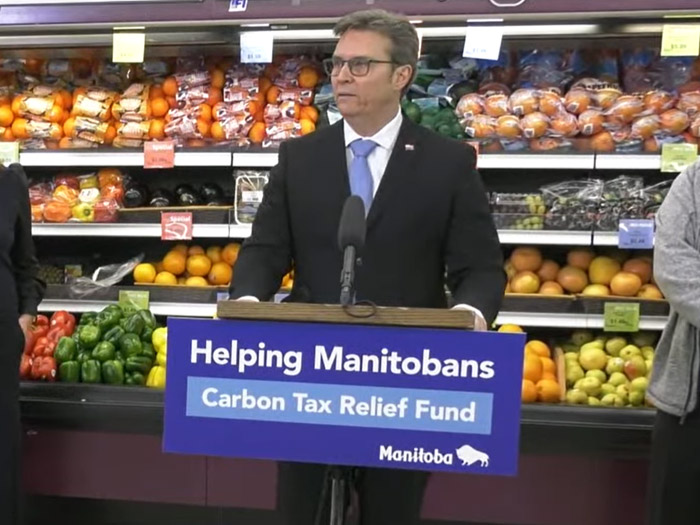As part of the Manitoba government’s ongoing effort to help Manitobans make ends meet, the province recently unveiled a $200-million Carbon Tax Relief Fund aimed at helping 700,000 Manitobans cope with the negative impacts of rising winter costs, from food to fuel.
The 2023 Carbon Tax Relief Fund will provide help for all Manitobans including seniors, singles and couples with or without children who lived in the province on Dec. 31, 2021, and whose family net income that year was less than $175,000.
“Last fall, we pledged to continue to help Manitobans as help was needed,” said Premier Heather Stefanson. “Given the cost shock Manitobans are facing this winter from the federal carbon tax and other related increases, we believe Manitobans need our support again now.”
The premier reiterated the Manitoba government’s calls for the federal government to put an immediate halt on the carbon tax and its harmful increases.
The Carbon Tax Relief Fund will provide $225 per single person and $375 per couple. For couples, the lower income earner will receive the payment.
“Our initial affordability package focused on helping families with children address back-to-school costs and seniors with fixed or low incomes address inflation-related challenges,” said the premier. “Our new Carbon Tax Relief Fund will broaden access to support almost every Manitoban who has to drive to work, take their kids to activities or go out to buy groceries.”
Statistics Canada’s Consumer Price Index reached a near 40-year high in June 2022 in Manitoba, peaking at 9.4 per cent growth year over year. In December 2022, the rate of growth was eight per cent, the highest among all provinces.
“Food and transportation costs have risen dramatically in the last few months, putting pressure on family finances,” said Stefanson. “But every family’s circumstances are different, and they will know how to best spend this money to help them make ends meet.”
The premier noted that the 2023 Carbon Tax Relief Fund is part of an $850-million package that will be detailed in the coming days meant to:
- address financial pressures within the health-care system;
- support Manitoba municipalities with targeted project funding; and
- help communities and industries to continue to recover.
Today’s funding commitment, the premier added, also builds on an initial 2022 program that provided approximately 145,000 families with children and a household income of less than $175,000 with a cheque for $250 for the first child and $200 for each additional child, and more than 52,000 seniors with less than $40,000 in family income a cheque for $300.
In addition, the first phase of the affordability package provided Manitobans receiving Employment and Income Assistance (EIA) a long-overdue increase to the basic needs rate, the premier said. EIA general assistance clients without dependent children began receiving an extra $50 per adult each month, and all EIA disability clients began receiving an additional $25 per household each month.
Stefanson noted historic tax relief measures were also part of Budget 2022 with a $2,020 Tax Rollback Guarantee, which has now been exceeded to $2,400 or $4,800 for a two-income family. Some of these initiatives include:
- indexing personal tax brackets and the basic personal amount;
- reducing the PST from eight per cent to seven per cent;
- exempting the costs of home insurance, personal services and preparing income tax returns and wills from PST;
- reducing vehicle registration fees;
- eliminating probate fees; and
- phasing out the education property tax.
“Our government is committed to helping Manitobans make ends meet as they continue to face rising prices due to inflation and the largely hidden, federally imposed carbon tax,” said Stefanson. “We truly hope this new Carbon Tax Relief Fund will help ease the strain many families are facing this winter.”


